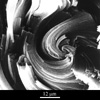Micrograph Library
Browse the libraryAdvanced searchSystemsCompositionsTechniquesKeywordsPhase diagramsHelpPreferencesAbout the micrograph libraryTerms of useContribute micrographs!FeedbackLinksCredits Print this page

Full Record for Micrograph 641

[83 KB]
View micrograph
.. in new window
View micrograph and record
.. in new window
You can also view and download the micrographs on Flickr
- Micrograph no
- 641
- Brief description
- Fracture surface in a liquid crystalline polymer
- Keywords
- alignment, fibre
 , fibrillation
, fibrillation  , fracture
, fracture  , liquid crystalline polymer (LCP), lyotropic, magnetic, nematic, polymer
, liquid crystalline polymer (LCP), lyotropic, magnetic, nematic, polymer 
- Categories
- Fracture, Polymer
- System
- Liquid crystalline polymer
- Composition
- Random copolyester of average molecular weight 14401
- Standard codes
- Reaction
- Processing
- No external field has been applied
- Applications
- The molecules in a LCP mesophase can be steered by external fields; a property used in display technology. Alignment is also exploited in high strength fibres like Kevlar and mouldable Vectra
- Sample preparation
- Technique
- Scanning electron microscopy (SEM)
- Length bar
- 12 μm
- Further information
- Above their melting point, liquid crystalline polymers exhibit a mesophase within which, although able to flow and are not arranged in a crystal, they exhibit long range orientational order. This molecular alignment can be exploited to make high strength and stiffness fibres such as Kevlar, or even mouldable thermotropics such as Vectra. Molecular alignment can also be controlled by an external applied field; a property exploited in liquid crystal displays. This specimen has not had a magnetic field applied to it and it exhibits only local molecular self-alignment, without any overall orientation alignment. It is to be compared with a similar sample which has been subjected to a magnetic field of 1.1T for one hour and in which there is a high level of fibrillar alignment.
- Contributor
- Prof A H Windle
- Organisation
- Department of Materials Science and Metallurgy, University of Cambridge
- Date
- 03/10/02
- Licence for re-use
 Attribution-NonCommercial-ShareAlike 4.0 International
Attribution-NonCommercial-ShareAlike 4.0 International- Related micrographs

